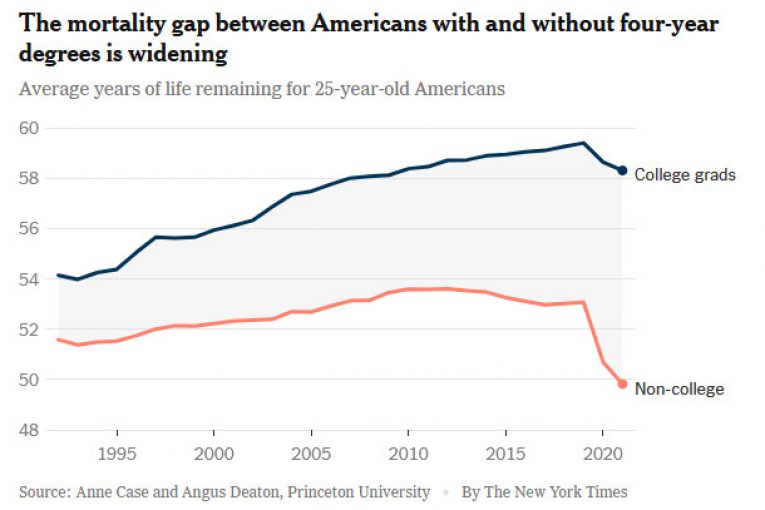
 By David M. Greenwald
By David M. Greenwald
Executive Editor
I have often found myself arguing with people that college degrees are no longer that important. The rationale goes that so many people have college degrees, degrees have been devalued—especially when it comes with the long-term cost of student loans.
That argument immediately runs into the tremendous income gap based on the amount of education.
On Tuesday, however, the NY Times reported (in an op-ed by Anne Case and Angus Deaton), in addition to the wealth gap is a huge death gap.
The Times reports, “there is not one but two Americas” and “a clear line demarcating the division is educational attainment. Americans with four-year college degrees are flourishing economically, while those without are struggling.”
Moreover, they found, “the America of those without college degrees has been scarred by death and staggeringly shorter life spans.”
There is a lot of irony wrapped into these findings—but a lot of the data here is at the core of the political divide.
The data show that “the United States has slowly, gradually and then precipitously  fallen behind” the rest of the developed or wealthy world in terms of life expectancy. The life expectancy for example in Japan is nearly 85 years old at birth, while in the US it’s about 76 AND falling somewhat rapidly.
fallen behind” the rest of the developed or wealthy world in terms of life expectancy. The life expectancy for example in Japan is nearly 85 years old at birth, while in the US it’s about 76 AND falling somewhat rapidly.
It is now by far the worst of the “rich” countries in terms of life expectancy—and it’s not even close.
Driving this data are not people who have college degrees, but rather people who do not.
Case and Deaton write that “we were staggered to discover that for those without college degrees, life expectancy reached its peak around 2010 and has been falling since, an unfolding disaster that has attracted little attention in the media or among elected officials.”
By the time the pandemic hit, both groups lost life expectancy. But while in 1990 it was only about a two-year gap, by 2021, it was about 8.5 years. Those without a college degree lost about 3.3 years of expected life during the pandemic.
How much of a driver is this? “If all Americans had the life expectancy of the college educated, the United States would have been one of the best performers among the rich countries in terms of life expectancy, not the worst. It is the experience of those without college degrees that accounts for America’s failure.”
The key question is why—and here they offer a lot of speculation.
One answer is clearly an economic divide—there simply aren’t a lot of well-paying jobs for people without college degrees.
I would argue that health care is a key factor. Ironically the very people who are often fighting against things like universal health care are the ones that actually need it most. You can argue that the US has the best health care system in the world but, if you can’t access it, it does little good.
As early as 2021, we found that education was a huge factor in vaccinations for COVID. One survey in early 2021 found that “76% of U.S. adults with at least a bachelor’s degree had been vaccinated or planned to get vaccinated, compared to just over half of adults (53%) with less education. In other words, a college degree is associated with a 43% increase in the likelihood that someone plans to get the vaccine.”
Perhaps that along with the lack of access to health care explains why there is such a huge fall in non-college educated life expectancy after 2020 compared with college educations.
There is also unhealthy behavior issue: “Unhealthy behaviors are more common among people without college degrees.”
There is also the opioid crisis. An NIH study from 2021, found, “Apart from the British Isles and especially Scotland, there is no indication of an opioid crisis comparable to that in the US in the 19 European countries that were part of this study.”
Another NIH study found links between low income and education level to deaths from opioid overdoses.
In 2020, “The study found that those who live at or below the poverty line, for instance, make up 31% of opioid overdose victims, while those not in the labor force make up 47%. The study also found those without a high school diploma make up 24% of deaths, and another 35% come from those without any level of college education.”
And yes, the NY Times pointed out that housing is a factor as well.
“Fighting NIMBYism (residents’ ‘not in my backyard’ opposition to local development) and expanding affordable housing in successful cities would increase mobility,” they write, failing to note the relation between housing and exposure to environmental hazards.
The writers conclude: “The suffering of less-educated America is not something that must happen, nor is it a necessary price to be paid for progress for the rest of us. Indeed, we find it hard to imagine that an educated elite can prosper indefinitely without a better future for everyone else.”
At the same time, I would argue that there are both political and structural reasons that are exacerbating the gap.
The bottom line is that things like poverty, crime, and health are all linked to educational attainment, and yet, we have continued to give them a back seat.


I found that there was a strong correlation in 2016 (~0.75) between a state’s obesity rate and the percentage voting for Trump. There is a deep cultural influence that steers away from healthy choices in certain regions.